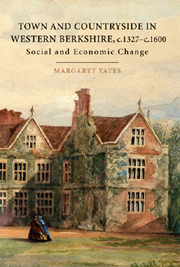Book contents
- Frontmatter
- Contents
- List of tables, figures, and maps
- Acknowledgements
- Abbreviations
- Sums of money
- 1 The end of the Middle Ages?
- 2 Landscapes, population and wealth in western Berkshire from the fourteenth to the sixteenth century
- 3 Town and country relations: Newbury and its hinterland
- 4 Estate management and profitability
- 5 Tenant society
- 6 Conclusion: the chronology of change
- Appendices
- I Documents, methodology and data relating to chapter 2
- II Comparative data for imports of woad and wine through Southampton from 1439–40 to 1491–92
- III Methodology and documentation for the case studies of chapter 4
- IV Tables containing the full data relating to chapter 5
- Bibliography
- Index
I - Documents, methodology and data relating to chapter 2
from Appendices
Published online by Cambridge University Press: 05 February 2013
- Frontmatter
- Contents
- List of tables, figures, and maps
- Acknowledgements
- Abbreviations
- Sums of money
- 1 The end of the Middle Ages?
- 2 Landscapes, population and wealth in western Berkshire from the fourteenth to the sixteenth century
- 3 Town and country relations: Newbury and its hinterland
- 4 Estate management and profitability
- 5 Tenant society
- 6 Conclusion: the chronology of change
- Appendices
- I Documents, methodology and data relating to chapter 2
- II Comparative data for imports of woad and wine through Southampton from 1439–40 to 1491–92
- III Methodology and documentation for the case studies of chapter 4
- IV Tables containing the full data relating to chapter 5
- Bibliography
- Index
Summary
The documentary evidence
Any study of the period from the fourteenth to sixteenth centuries must employ documents which span these centuries to avoid the danger that the changes observed were archivally driven. The comparative sections of chapter 2 are based, to a large part, on an examination of documents created as part of the process of taxation. These sources were created at a national level so that comparisons can be made across a wide geographical area with reasonable confidence that the data are comparable. In the late medieval and early modern periods most forms of direct taxation were granted by Parliament to provide extraordinary sources of revenue to assist the king in bearing an extraordinary burden of expenditure, normally associated with war or the preparation for war. Taxation was therefore intermittent. The types of tax varied between the fourteenth and sixteenth centuries and therefore it is essential to understand why the tax was demanded, who was liable to pay, the threshold for exemption, the basis of assessment for the particular tax, who made the assessments, and how the tax was to be collected. It is acknowledged that this type of documentary evidence contain many inconsistencies. While acknowledging their limitations it is, however, acceptable to employ them as a comparative framework for a more detailed study of an area, such as this one, where they form only one category of documentary evidence among many.
- Type
- Chapter
- Information
- Town and Countryside in Western Berkshire, c.1327–c.1600Social and Economic Change, pp. 250 - 261Publisher: Boydell & BrewerPrint publication year: 2007



